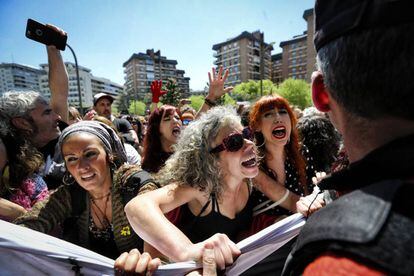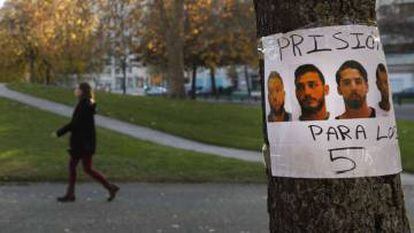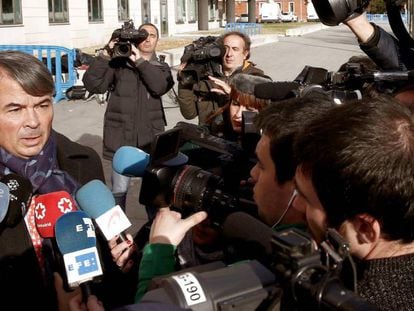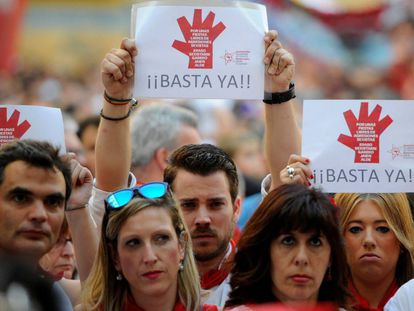“Running of the Bulls” defendants escape rape convictions
Ruling finding the five men guilty of the lesser charge of “sexual abuse” of an 18-year-old at Sanfermines sparks protests in Pamplona

A court in Navarre, Spain has found five men guilty of sexually abusing an 18-year-old woman at the 2016 Running of the Bulls festival in Pamplona. They each received nine-year prison sentences and an additional five years of probation.
But the three-judge panel convicted the men of sexual abuse, not rape, which would have entailed much longer prison terms. The prosecution had sought 22 years for each defendant on the more serious charge.
The decision, made public early Thursday afternoon, triggered protests outside the Audiencia de Navarra courthouse in Pamplona. Supporters of the victim loudly chanted “We want justice!” and “Rape is not abuse!”
"¡Esta justicia es una mierda!". Gritos de indignación ante las puertas de la Audiencia de Navarra por la sentencia contra #LaManada https://t.co/rnveJP31zH pic.twitter.com/aua4yNLhRb
— EL PAÍS (@el_pais) April 26, 2018
“This justice is crap!” Cries of indignation outside the Audiencia de Navarra over the ruling against La Manada.
Women’s groups were also critical of the decision. Yolanda Besteiro, president of the Federation of Progressive Women, told the news agency Europa Press that it is “a sweetened sentence that does not sanction the gravity of the facts. It is very disappointing.” Feminist groups have announced further protests throughout Spain.
Politicians also weighed in on the case. The speaker of the Basque government, Josu Erkoreka, said the ruling is “incomprehensible” unless “women are objectified” and “sexist violence is considered fully legitimate.”
High-profile case
The high-profile case galvanized public opinion, especially after it emerged that private detectives working for the defense had followed the victim, who was 18 at the time of the attack, and tracked her online activities in an apparent bid to demonstrate that she was not deeply affected by the incident. The public outcry prompted the defense to withdraw the report from the evidence.

This and other cases of sexual violence at the world-famous, often alcohol-fueled festival triggered a wave of citizen concern, and the city of Pamplona has since rolled out new measures to increase security and raise awareness about the issue.
The lead judge of a three-member panel, José Francisco Cobo, read out the sentence, announcing that the defendants had been found guilty of “continuous sexual abuse,” despite having being accused of sexually assaulting – i.e. raping – the young woman. The judges ruled that there was no violence nor intimidation toward the victim, but that consent was obtained given the “situation of superiority” that “encroached on the freedom of the victim.”
The five men will also have to pay the victim €10,000 each, and all will be subject to a restraining order that will prevent them from approaching or contacting the victim.
The judges took five months to rule in the case, three more than expected. The panel was split on their decision, with one of the three magistrates voting to acquit the five defendants of all sexual charges.
The sentence can be appealed with the regional High Court, and may end up in the Spanish Supreme Court, which will have the final word on the case.
Sexual abuse vs aggression
Under the Spanish criminal code the offense of “sexual abuse” is defined as when there is sexual contact without explicit consent of the victim and without physical violence. It is applied in cases of minors, who are unable to grant consent, or persons with any kind of disability, or those who are drunk or under the effects of drugs, and as such are not in a condition to authorize sexual activity.

The prosecutor in the case had sought 22-year prison terms for sexual assault, which is sexual contact without consent and using violence. This category includes rape.
The incident took place in July 2016 in the northern Spanish city of Pamplona during the popular Sanfermines fiestas, known more widely as the Running of the Bulls in the English-speaking world.
The case became known as “La Manada,” or The Pack, after the name of the WhatsApp group used by the defendants and other friends of theirs to chat. All five, who were between 25 and 27 at the time, are from Seville and include one member of the Civil Guard and a member of the armed forces. Both have since been suspended.
The attack was filmed by the defendants, who also stole the woman’s cellphone. Afterwards, the victim was found crying on a bench by a couple, who urged her to go to the police.
The trial took place in November, and stretched out over 11 sessions in which the defense sought to convince the court that the woman was not the victim of sexual assault, but instead consented to sexual relations with all five men.
The defendants previously admitted to having had unprotected group sex with the young woman and filming the acts. “In other words, they knew exactly what they were doing,” said public prosecutor Elena Sarasate at the trial.
The prosecutor also expressed outrage at the defense team’s argument that it could not have been rape as the woman did not try and defend herself by “biting their penises.”
During the trial, the young woman admitted that the defendants did not use force to take her into the doorway where they assaulted her. Instead, two of them took her by the hand. But the first of the five defendants admitted that the victim did not expressly consent to sexual relations.
During her testimony, the victim gave a detailed account of what happened that night. “I was completely in shock,” she told the court. “I didn’t know what to do, I wanted everything to be over quickly and I closed my eyes so as to not see what was happening and for it to finish fast.”
English version by Susana Urra and Simon Hunter.













































